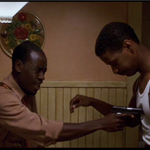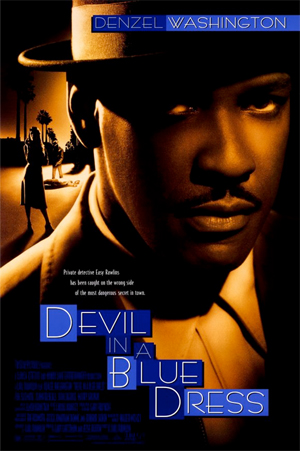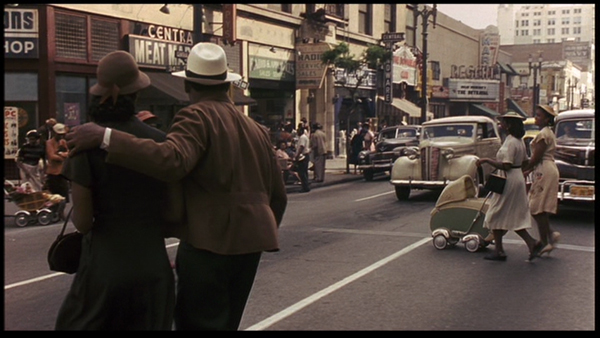 It looks like I’m continuing my informal and logo-free History of Black Film series a little bit into March. It could be argued that this is because I got side-tracked writing about ROBOCOP and then went out of town and got snowed in there and got behind schedule on my reviews. But in my opinion I’m really doing it in protest of the injustice of Black History Month being slotted in the shortest month.
It looks like I’m continuing my informal and logo-free History of Black Film series a little bit into March. It could be argued that this is because I got side-tracked writing about ROBOCOP and then went out of town and got snowed in there and got behind schedule on my reviews. But in my opinion I’m really doing it in protest of the injustice of Black History Month being slotted in the shortest month.
I also want to admit that at the beginning I said I was gonna be exploring obscure black action stars, then instead I’ve been looking at lesser known black directors, not really the same thing at all. That’s not because the whole thing was poorly planned and thought out on my part, it’s because you gotta be fluid about these things and follow your creative instincts.
DEVIL IN A BLUE DRESS is another one where a black director adapts one installment in a mystery series by a black writer. Not that that’s a big category, I’m just saying that’s a parallel to COTTON COMES TO HARLEM. The director is Carl Franklin (ONE FALSE MOVE), the author is Walter Mosley and the mystery-solver is Ezekiel “Easy” Rawlins, later a private eye but as of this story an a WWII vet laid off from an airplane factory having a hard time getting work until a white P.I. played by Tom Sizemore (SPOILER: I don’t know if you should trust this guy) pays him to look for a white woman (Jennifer Beals) who hangs out in black underground clubs that a white man (but not white woman) would have trouble slipping into without causing a problem.
 Denzel Washington (RICOCHET) plays Easy, and this is 1995, same year as CRIMSON TIDE, he’s probly about 40 but he doesn’t look that much older than in THE MIGHTY QUINN. He could still play young and wild, not just old and intense. He wears a ribbed tank top for most of the movie and has a strong sexual tension with more than one woman.
Denzel Washington (RICOCHET) plays Easy, and this is 1995, same year as CRIMSON TIDE, he’s probly about 40 but he doesn’t look that much older than in THE MIGHTY QUINN. He could still play young and wild, not just old and intense. He wears a ribbed tank top for most of the movie and has a strong sexual tension with more than one woman.
In fact, there’s a long drawn out flirtation with his friend’s girlfriend, Coretta (Lisa Nicole Carson), they end up fucking while his friend is passed out in the next room. Things get worse from there until there’s a depressing scene where Coretta has been murdered and the buddy is crying to Easy and talking about how Coretta was always loyal to him. Uh… yeah, yeah that’s right, she was, you can always have that to remember her by, that’s for sure pal. The whole affair is terribly selazy but also kinda hot because of how womanly she is. Very aggressive toward him but a grown up and not some Hollywood waif.
It seemed kind of weird to me that Easy (SEXUAL TENSION SPOILER) never gets it on with the more traditionally femme fatale type character Daphne Monet, but then I read that they shot that and didn’t think it fit in.
Of course, this is the type of story where people keep turning up dead, people are lying to him, he’s getting in over his head, getting set up, there are some photos everybody’s trying to get and some money. Mystery shit. Easy’s gotta clear his name and he wouldn’t mind the money either.
The setting is Los Angeles, 1948, only a handful of years earlier than L.A. CONFIDENTIAL but different because we’re looking mostly at the other half of a segregated city. There are some nice shots of Los Angeles neighborhoods done up in lush period detail that we’ve seen done for Harlem a few times but I believe this is South Central Los Angeles, known in movies mainly as ’90s gang territory. Nice to see it depicted in a more positive light, at least on the surface.

Side note: you know me, I had to figure out what movie was referenced on the theater marquee in the background of this opening shot. I figured out it’s THE BETRAYAL, which really did come out in the summer of 1948. Remember in the BRONZE BUCKAROO review I talked about the “race films,” the separate black film industry that used to exist? This was one of them, the last film by pioneering director Oscar Michaux, adapted from his own novel. It was 183 minutes long (12 minutes longer in his director’s cut!), got horrible reviews by both the black and white press, was a huge box office flop and has been lost. It never got a second chance on blu-ray like ONCE UPON A TIME IN AMERICA, HEAVEN’S GATE or THE LONE RANGER, but it got this cool nod from Carl Franklin.
I’m a sucker for old theaters, so when I saw that Regent sign I tried to figure out if this is depicting an actual historic location. I guess not because based on the street signs I’m pretty sure this is the street view of the real block we’re supposed to be seeing. I figured out this is the block with the actual (closed, of course) Regent Theater, where they filmed the scene. So upstairs from Blossom Vietnamese Restaurant is Joppy’s Bar, where Easy Rawlins hangs out.
Oh shit, why did I have to compare a filming location to a Google street view? It was surprisingly satisfying. I hope this doesn’t become a problem for me.
Anyway, the point is that South Central L.A. 1948 is a world that we haven’t really seen in movies before, and that makes it exciting. This is definitely a neo-noir in style. Easy narrates quite a bit and there are some retro dissolve type transitions and stuff. Also a great soundtrack of blues and jazz (score by Elmer Bernstein [THE TEN COMMANDMENTS, THE TRIAL OF BILLY JACK]) really ups the period atmosphere. But because of the change in race, all the noir character attributes take on a different context. For example, the scene where he gets accosted by a bunch of kids and things get out of control happens just because he has a conversation with a white girl. And when he gets unfairly arrested and beaten there is a very different power dynamic going on there than when it happens to a white antihero because of the racist system in place. No matter how down on your luck you noir guys think you are you don’t have to deal with this type of shit that Easy does.
I’m sure there are white detective characters with a prime motivation of being desperate to pay their mortgage. There’s definitely the thing where they take on a client they shouldn’t because they’re struggling to keep their agency in business. But it takes on extra importance here because, as the movie points out, there weren’t that many black homeowners in 1948 Los Angeles. It was a matter of pride to him. It’s not “ah man, I gotta stop being a deadbeat, I gotta scrape by,” it’s more like “I was in the army, I am a working man, I own my own house, I am going to make it in this country and those motherfuckers can’t stop me.”
Historically the movie is important as a breakthrough role for Don Cheadle. He’d been in alot of TV (notably Picket Fences) as well as parts in COLORS and METEOR MAN and stuff, but I think this is what really put him on most people’s radar. If you look at his filmography, his third credit (after “Juicy Burgers Worker” in MOVING VIOLATIONS) is a 1986 short called PUNK written and directed by Franklin. So they must be old friends.
Even now, DEVIL IN A BLUE DRESS stands out in Cheadle’s body of work because we mostly know him as likable good guys. This is one part that mixed with 2 or 3 parts cold-hearted Maurice from OUT OF SIGHT. He plays Mouse, a psycho who Easy knows from growing up in Houston (specifically they’re supposed to’ve grown up in the Fifth Ward, so in my opinion Mouse is probly grandfather of one of the Geto Boys). Easy was friends with Mouse and even gets to call him “Raymond,” but he’s scared of him now because of his craziness and some shooting incident that happened last time he saw him. We hear about Mouse a few times in the first half of the movie before he finally shows up and immediately lives up to his reputation. He does a badass move of having a guy at gunpoint and pulling out a second gun of smaller caliber to shoot him so it hurts but doesn’t kill him.
Mouse makes a great sort-of-sidekick, because it’s thrilling when he comes through and helps Easy out of a jam, but there’s genuine suspense about if he’s gonna make things worse. Easy is always having to talk him out of shooting people, including himself one time when Mouse is drunk and thinks he has to prove his quick draw skills.
This is a guy who thinks he’s making a reasonable point when he asks, “Easy, if you didn’t want me to kill him why’d you leave him with me?” He’s a crazy motherfucker and it’s not played for laughs like Riggs in the LETHAL WEAPONs. It’s played for “oh shit”s. I’m not really clear whether it’s good or bad to have Mouse in your corner. I guess both.
Let’s take a moment to acknowledge the title. I think it’s cool because it follows the formula of a title like THE SPOOK WHO SAT BY THE DOOR but switches things up racially. The “devil” is a double meaning of a person who’s gonna get you into alot of trouble and a slur for a white person. Of course there’s no equivalence, no slur for white people is ever gonna hurt like a slur that has aided oppression of minorities, but “devil” is probly the meanest one. It’s a cool title.
I think what gives the story a little extra kick is in the explanation of what’s going on. BIG OL’ MYSTERY SPOILERS IN THIS PARAGRAPH. It turns out it’s all about blackmailing – a politician is trying to hide his kiddie porn photos and the titleastic devil is trying to hide that she’s not full-on devil, she’s actually part Creole and doing what they called “passing” back then. Both are detrimental to political campaigns – this guy is not gonna become mayor if people know he rapes kids, and a white politician is not gonna marry her if the public knows she’s black. Obviously we know that the racism of the era was terrible, but that’s a pretty great way to paint a picture of it, to show this poor lady fighting just as hard to hide something that shouldn’t have to be hidden as a despicable criminal trying to hide his actual horrendous behavior.
To be honest I like the movie more for these type of details than for the actual story. It’s fine but not completely riveting, I don’t think it would cut it for me if not for how much I like these characters and the world they inhabit and how nice it looks (shot by Tak Fujimoto of BADLANDS fame). Still, it’s good enough I was thinking it’s too bad they didn’t do more Easy and Mouse movies. Luckily research on the books reignited the flame of hope. I mentioned COTTON COMES TO HARLEM at the beginning. Unlike Chester Himes, Mosley (who is credited as associated producer on the movie) is a contemporary writer looking back at a historical period – the book is from 1990. He’s still writing Easy Rawlins books and short stories (one called Little Green came out last year) and currently has them taking place in 1967. So Denzel and Cheadle are not too old to play these characters again.
So let’s get to it, gentlemen! You know what we want.
http://youtu.be/hgUHSjbfIQw




























March 3rd, 2014 at 2:57 pm
I haven’t gone back and watched this since I started reading the books, and part of that is because I have a hard time picturing Cheadle as Mouse. Mouse is such a great, scary, funny, force of nature character that I’m not sure anyone could live up to him, even a great actor like Cheadle. But I should give it a shot. The book wasn’t one of my favorites when I read it, but Easy Rawlins has really grown on me over the years. I like that his life progresses as the series continues. He’s not ageless like Parker, and he doesn’t exist in some kind of permanent noir alternate history like other detectives. You check in on him every few years and his whole world is different. It’s a good way to keep the series from getting repetitive.
Mouse is also in the grand tradition of one of my favorite mystery novel tropes: the hard-boiled detective’s even more badass friend. It allows the writer to keep his hero from becoming too overpowered because sometimes there’s a threat that he can’t handle alone, so he’s got to call in the really big guns. There’s Max the Silent in the Burke novels. You’ve got Hawke in the (overrated) Spenser franchise. Bubba in Dennis Lehane’s excellent Kenzie & Gennaro series. Sort of Leonard in Joe Lansdale’s Hap & Leonard books, but he’s more of a co-star than a sidekick, even though Hap is the narrator. I love these characters, because they’re like the Sword of Damocles dangling over the villain’s head. You’re reading along as he seems to be getting away with it, but the whole time you’re thinking, “Yeah, you think you’re tough now, asshole, but wait till THIS motherfucker shows up.” It’s such a satisfying trope that I’m using it in my own mystery series in which the hero is a diminutive fellow but his ironically little brother is this giant badass.
In conclusion, you should all read all the books I mentioned, especially my own whenever it finally gets published
Except maybe those Spenser books. I just don’t like Spenser. He tries to act like he’s so cool but he just comes off like somebody’s middle-aged dad wearing a leather bomber jacket and cracking corny jokes that nobody laughs at but him.